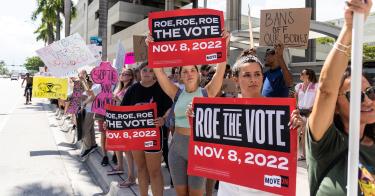For 50 years, the Supreme Court’s 1973 decision in Roe v. Wade, which invented a fictional “right to abortion,” prevented most efforts to protect human lives before birth. Last year’s decision in Dobbs v. Jackson Women’s Health Organization corrected that egregious error, lifting that impediment to pro-life efforts in state legislatures and Congress. Pro-abortion forces, however, are relentless and are trying to use state constitutions to create a state-level “right” to abortion and shut down pro-life legislation. The latest conflict is in Florida.
Since 1980, the Florida Constitution has provided: “Every natural person has the right to be let alone and free from government intrusion into the person’s private life except as otherwise provided herein.” In 1989, the Florida Supreme Court interpreted this right of privacy to include “a woman’s decision whether or not to continue her pregnancy” and that infringing this right requires “that the statute furthers a compelling state interest through the least intrusive means.”
Like several other states had done in recent years, the Florida legislature enacted a ban on most abortions after 15 weeks of pregnancy in April 2022, shortly before the Dobbs decision was issued, that would go into effect if the Supreme Court overruled Roe v. Wade.
In 2023, as the lawsuit over the 15-week ban was underway, Florida adopted a law banning most abortions after a heartbeat can be detected (at six weeks). If the Florida Supreme Court holds that the Florida Constitution does not protect a right to abortion, or otherwise allows the 15-week ban to go into effect, the tighter restriction will replace it as the law in Florida.
Perhaps anticipating the Dobbs outcome, Planned Parenthood and several abortion clinics challenged the 15-week law in state court, claiming that it violated the Florida Constitution. The Florida Court of Appeals found the law constitutional, and the Florida Supreme Court heard arguments on Sept. 8.
During those arguments, an attorney with the American Civil Liberties Union, Whitney White, arguing on behalf of Planned Parenthood, focused on what is, and is not, in the Florida Constitution. The privacy clause that appears in the constitution is written in broad language, and, in 2012, the voters rejected a constitutional amendment that would have overruled the state supreme court’s 1989 precedent creating a state right to abortion. Together, White argued, these supported maintaining the court’s 1989 interpretation.
Justice Jamie Grosshans seemed dubious about Planned Parenthood’s position on originalist grounds, observing that there existed few “supporting documents to show that that was the understanding of any voter in the state in 1980,” when the language in the constitution was adopted.
Justice Carlos Muniz also questioned whether the terminology used to express “the legal understanding of a right of privacy” can be “extended to … the abortion context.”
Representing Florida, Solicitor General Henry Whitaker argued that, correctly interpreted, “privacy” as it appears in the Florida Constitution refers to informational privacy rather than a generalized notion of bodily autonomy or abortion.
The Florida Supreme Court, which had long been one of the most liberal courts in the country, has seen significant personnel changes in recent years. Five out of the seven current justices have been appointed since 2019—all of them ideologically conservative. This rapid shift has changed expectations as to how the court is likely to read the state constitution and whether the justices will be willing to revisit prior state constitutional precedents.
In a few states, supreme courts have changed their approach to constitutional interpretation after the courts’ composition changed. In 2018, for example, the Iowa Supreme Court, as the U.S. Supreme Court had done in Roe, relied on the Iowa Constitution’s due process clause to create a right to abortion. Four years later, after the appointment of several new justices, the court overturned its previous decision, holding that “there is no support for abortion as a fundamental constitutional right in Iowa.”
In January, the South Carolina Supreme Court decided that its constitution’s privacy provision protected a right to abortion, even though that provision appeared limited to the context of “unreasonable searches and seizures.” In August, however, after one justice in the previous majority had been replaced, the court reversed itself and upheld a state law banning most abortions after the baby’s heartbeat can be detected.
Three states—California, Michigan, and Vermont—now have constitutional provisions explicitly protecting the right to an abortion. And abortion and gender activists are hoping to change the Ohio Constitution next month in the same direction.
Elsewhere, as in Florida, they are focusing their efforts on states with a constitutional provision regarding due process or privacy, urging the highest court in those states to invent or retain a right to abortion that does not explicitly appear in the text itself. The Florida Supreme Court will soon announce which side of that conflict it will join.
This piece originally appeared in The Daily Signal



